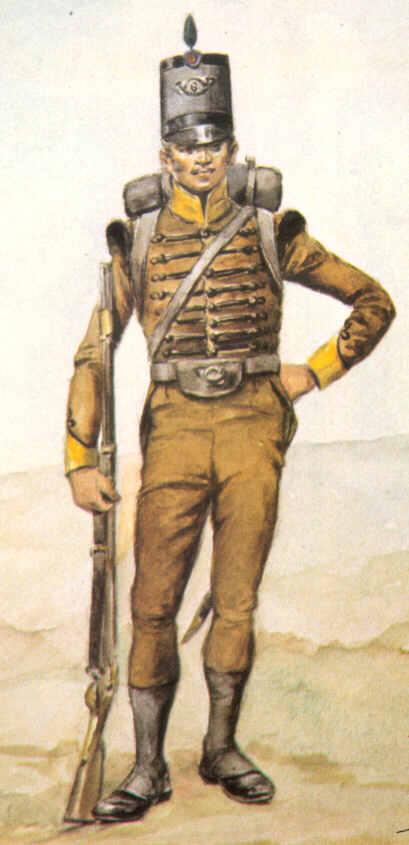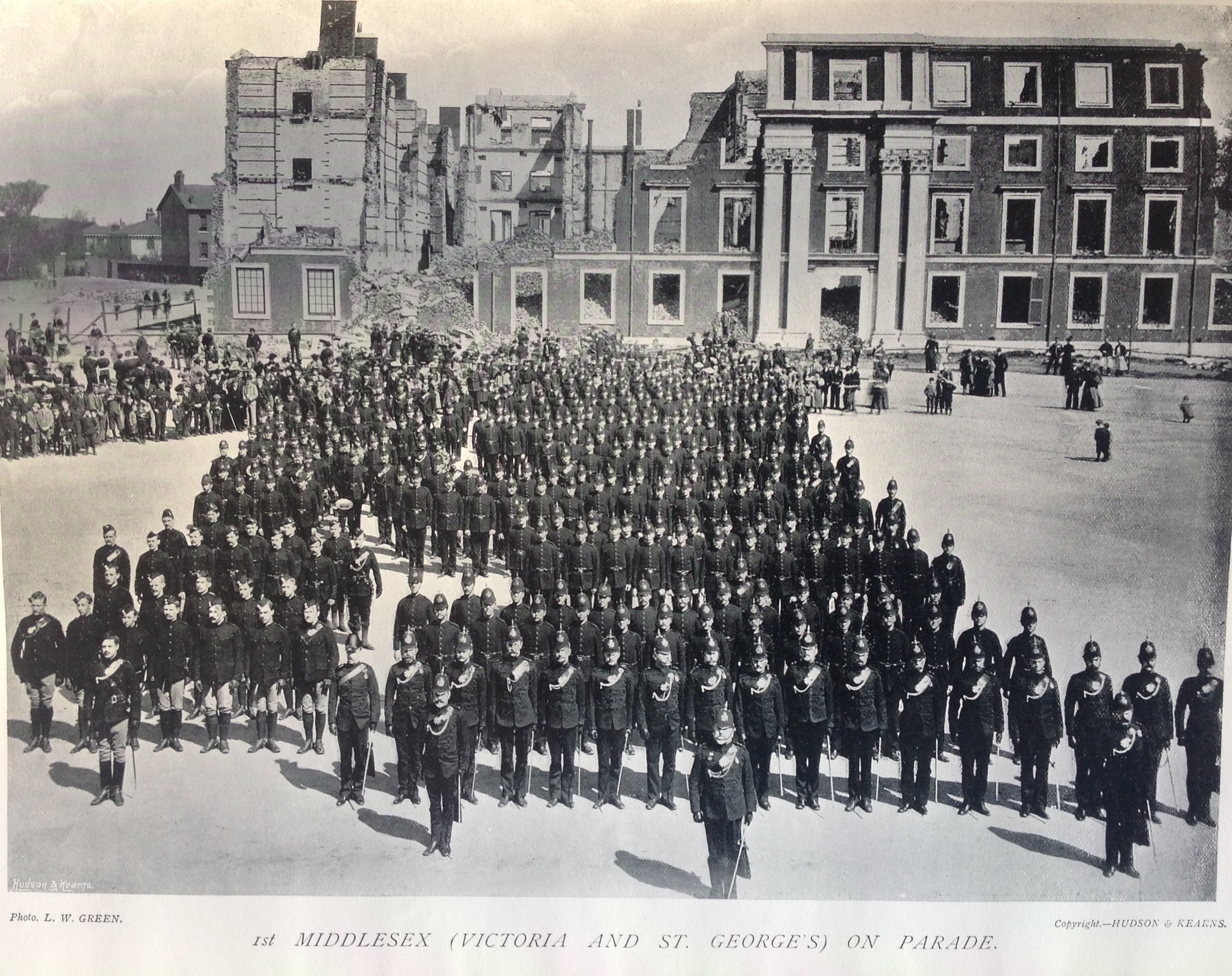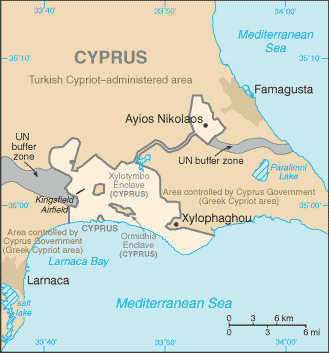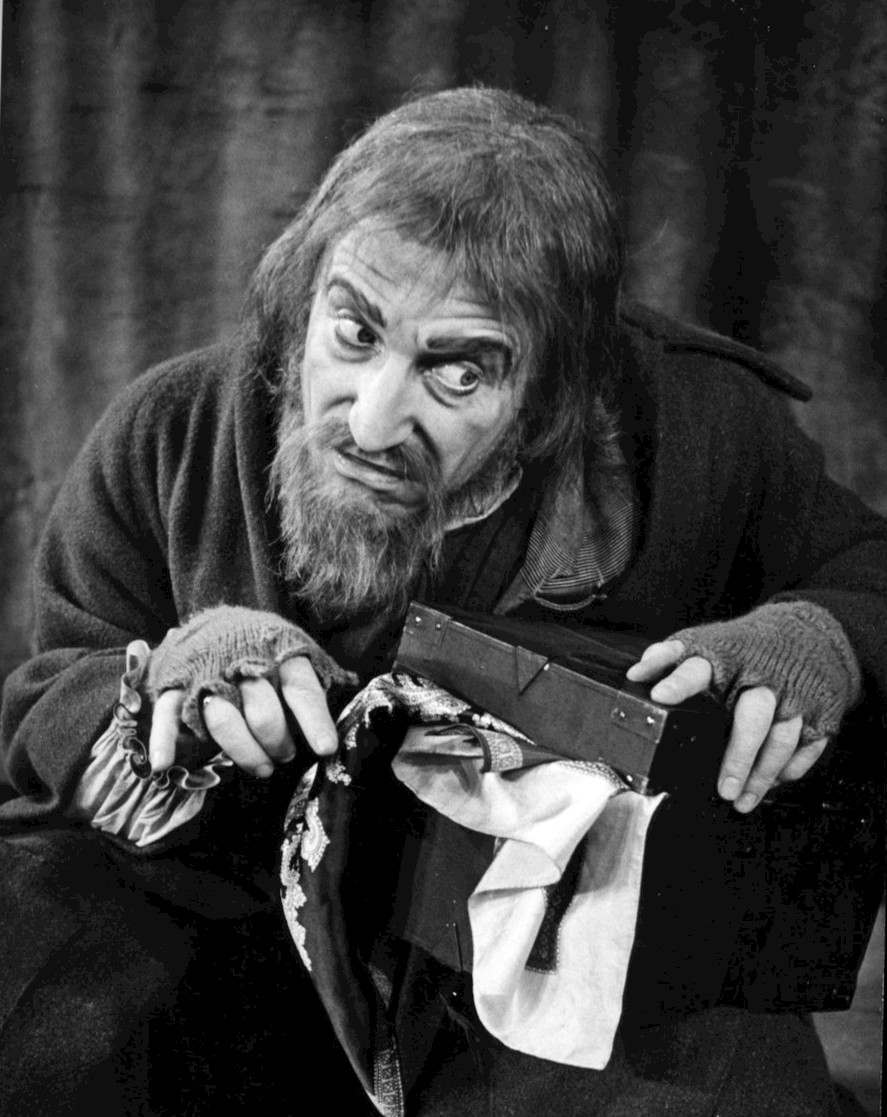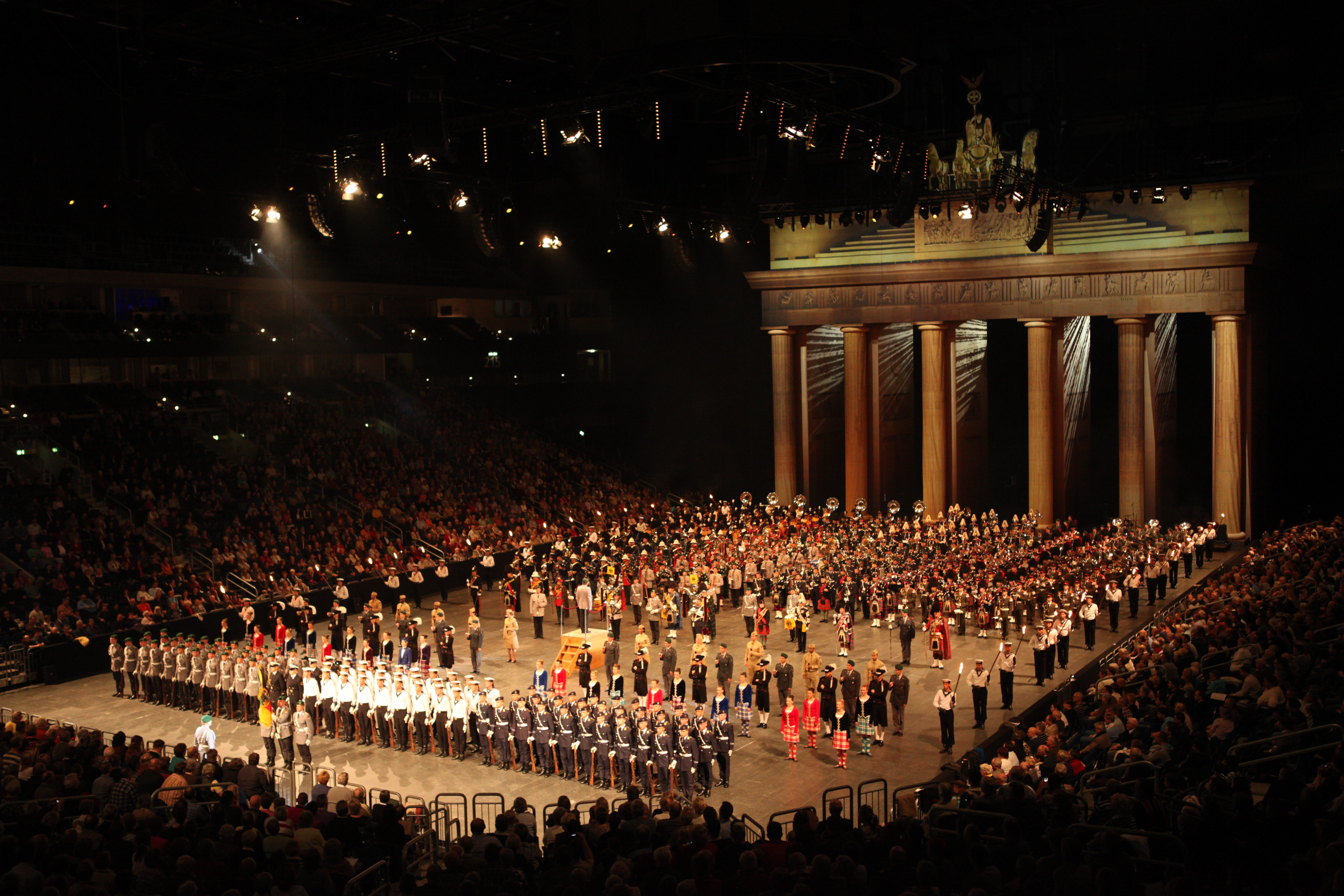|
Royal Green Jackets
The Royal Green Jackets (RGJ) was an infantry regiment of the British Army, one of two "large regiments" within the Light Division (the other being The Light Infantry). History The Royal Green Jackets was formed on 1 January 1966 by the amalgamation of the three separate regiments of the Green Jackets Brigade: * 1st Green Jackets (43rd and 52nd) *2nd Green Jackets, the King's Royal Rifle Corps *3rd Green Jackets, the Rifle Brigade (Prince Consort's Own). There were also two Territorial Army battalions made up as follows: * 4th (V) Battalion, Royal Green Jackets – formed from the remnants of the Rangers (KRRC), London Rifle Brigade, Tower Hamlets Rifles, Queen's Westminsters, Queen Victoria's Rifles, Queen's Royal Rifles and Civil Service Rifles. * 5th (V) Battalion, Royal Green Jackets – formed from the 4th Battalion, Oxfordshire and Buckinghamshire Light Infantry (TA) and the Buckinghamshire Battalion, Oxfordshire and Buckinghamshire Light Infantry. During the 1980s, the ... [...More Info...] [...Related Items...] OR: [Wikipedia] [Google] [Baidu] |
Light Infantry
Light infantry refers to certain types of lightly equipped infantry throughout history. They have a more mobile or fluid function than other types of infantry, such as heavy infantry or line infantry. Historically, light infantry often fought as Reconnaissance, scouts, Raid (military), raiders, and skirmisher, skirmishers. These are loose formations that fight ahead of the main army to harass, delay, disrupt supply lines, engage the enemy’s own skirmishing forces, and generally "soften up" an enemy before the main battle. Light infantrymen were also often responsible for Screening (tactical), screening the main body of a military formation. Post-World War II, the term "light infantry" evolved to include rapid-deployment units (including commandos and Airborne forces, airborne units) that emphasize speed and mobility over armor and firepower. Some units or battalions that historically held a skirmishing role have kept their designation "light infantry" for the sake of traditi ... [...More Info...] [...Related Items...] OR: [Wikipedia] [Google] [Baidu] |
Queen Victoria's Rifles
The 9th (County of London) Battalion, London Regiment (Queen Victoria's Rifles) was a Territorial Army infantry Infantry is a military specialization which engages in ground combat on foot. Infantry generally consists of light infantry, mountain infantry, motorized infantry & mechanized infantry, airborne infantry, air assault infantry, and marine i ... battalion of the British Army. The London Regiment (1908–1938), London Regiment was formed in 1908 in order to regiment the various Volunteer Force (Great Britain), Volunteer Force battalions in the newly formed County of London, and the Queen Victoria's Rifles were one of twenty six units brought together in this way. History Early history The Queen Victoria’s Rifles could trace their origins back to the old volunteer regiments of the Napoleonic Wars when the Duke of Cumberland's Sharpshooters were formed as a Corps of Riflemen on 5 September 1803. The regiment was raised as the 1st (Victoria Rifle Club) Middlese ... [...More Info...] [...Related Items...] OR: [Wikipedia] [Google] [Baidu] |
Dhekelia Cantonment
Dhekelia Cantonment ( el, Φρουρά Δεκέλεια, tr, Dikelya Cantonment) is a military base in Akrotiri and Dhekelia, a British Overseas Territory on the island of Cyprus, administered as the Sovereign Base Areas. It is located in the Eastern Sovereign Base Area, one of the two areas which comprise the territory. It is the larger of the British military bases on the island, and it is also the location of Alexander Barracks, which is home to 2nd Battalion, The Princess of Wales's Royal Regiment. In autumn 2017 the 2nd Battalion Royal Anglian Regiment deployed to Dhekelia replacing 2nd Battalion, The Princess of Wales's Royal Regiment. It forms a part of British Forces Cyprus. The eastern part of the cantonment includes Ayios Nikolaos Station and a Green Line crossing point. The western part includes several Greek Cypriot enclaves including Xylotymbou, Ormidhia and Dhekelia Power Station. The two parts of the cantonment are joined by a narrow corridor little wider tha ... [...More Info...] [...Related Items...] OR: [Wikipedia] [Google] [Baidu] |
BBC News
BBC News is an operational business division of the British Broadcasting Corporation (BBC) responsible for the gathering and broadcasting of news and current affairs in the UK and around the world. The department is the world's largest broadcast news organisation and generates about 120 hours of radio and television output each day, as well as online news coverage. The service maintains 50 foreign news bureaus with more than 250 correspondents around the world. Deborah Turness has been the CEO of news and current affairs since September 2022. In 2019, it was reported in an Ofcom report that the BBC spent £136m on news during the period April 2018 to March 2019. BBC News' domestic, global and online news divisions are housed within the largest live newsroom in Europe, in Broadcasting House in central London. Parliamentary coverage is produced and broadcast from studios in London. Through BBC English Regions, the BBC also has regional centres across England and national news c ... [...More Info...] [...Related Items...] OR: [Wikipedia] [Google] [Baidu] |
Oliver!
''Oliver!'' is a coming-of-age stage musical, with book, music and lyrics by Lionel Bart. The musical is based upon the 1838 novel '' Oliver Twist'' by Charles Dickens. It premiered at the Wimbledon Theatre, southwest London in 1960 before opening in the West End, where it enjoyed a record-breaking long run. ''Oliver!'' ran on Broadway, after being brought to the U.S. by producer David Merrick in 1963. Major London revivals played from 1977–1980, 1994–1998, 2008–2011 and on tour in the UK from 2011–2013. Additionally, its 1968 film adaptation, directed by Carol Reed, won six Academy Awards including Best Picture. ''Oliver!'' received thousands of performances in British schools, becoming one of the most popular school musicals. In 1963 Lionel Bart received the Tony Award for Best Original Score. Many songs are well known to the public, such as "Food, Glorious Food", "Consider Yourself" and " I'd Do Anything". ''Oliver!'' was one of eight UK musicals featured on Roy ... [...More Info...] [...Related Items...] OR: [Wikipedia] [Google] [Baidu] |
Hyde Park And Regent's Park Bombings
The Hyde Park and Regent's Park bombings were carried out on 20 July 1982 in London, England. Members of the Provisional Irish Republican Army (IRA) detonated two improvised explosive devices during British military ceremonies in Hyde Park and Regent's Park, both in central London. The explosions killed eleven military personnel: four soldiers of the Blues and Royals at Hyde Park, and seven bandsmen of the Royal Green Jackets at Regent's Park. Seven of the Blues and Royals' horses were also killed in the attack. One seriously injured horse, Sefton, survived and was subsequently featured on television programmes and was awarded " Horse of the Year". In 1987, Gilbert "Danny" McNamee was convicted of making the Hyde Park bomb and jailed for 25 years. He served 12 years before being released under the terms of the Good Friday Agreement; his conviction was later quashed. In 2013, IRA member John Downey was charged with four counts of murder in relation to the Hyde Park attack; ... [...More Info...] [...Related Items...] OR: [Wikipedia] [Google] [Baidu] |
Provisional Irish Republican Army
The Irish Republican Army (IRA; ), also known as the Provisional Irish Republican Army, and informally as the Provos, was an Irish republican paramilitary organisation that sought to end British rule in Northern Ireland, facilitate Irish reunification and bring about an independent, socialist republic encompassing all of Ireland. It was the most active republican paramilitary group during the Troubles. It saw itself as the army of the all-island Irish Republic and as the sole legitimate successor to the original IRA from the Irish War of Independence. It was designated a terrorist organisation in the United Kingdom and an unlawful organisation in the Republic of Ireland, both of whose authority it rejected. The Provisional IRA emerged in December 1969, due to a split within the previous incarnation of the IRA and the broader Irish republican movement. It was initially the minority faction in the split compared to the Official IRA, but became the dominant faction by 1972. T ... [...More Info...] [...Related Items...] OR: [Wikipedia] [Google] [Baidu] |
Military Band
A military band is a group of personnel that performs musical duties for military functions, usually for the armed forces. A typical military band consists mostly of wind and percussion instruments. The conductor of a band commonly bears the title of Bandmaster or Director of Music. Ottoman military bands are thought to be the oldest variety of military marching bands in the world, dating from the 13th century. The military band is capable of playing ceremonial and marching music, including the national anthems and patriotic songs of not only their own nation but others as well, both while stationary and as a marching band. Military bands also play a part in military funeral ceremonies. There are two types of historical traditions in military bands. The first is military field music. This type of music includes bugles (or other natural instruments such as natural trumpets or natural horns), bagpipes, or fifes and almost always drums. This type of music was used to control troo ... [...More Info...] [...Related Items...] OR: [Wikipedia] [Google] [Baidu] |
Celle
Celle () is a town and capital of the district of Celle, in Lower Saxony, Germany. The town is situated on the banks of the river Aller, a tributary of the Weser, and has a population of about 71,000. Celle is the southern gateway to the Lüneburg Heath, has a castle ('' Schloss Celle'') built in the Renaissance and Baroque style and a picturesque old town centre (the ''Altstadt'') with over 400 timber-framed houses, making Celle one of the most remarkable members of the German Timber-Frame Road. From 1378 to 1705, Celle was the official residence of the Lüneburg branch of the dukes of Brunswick-Lüneburg ( House of Welf) who had been banished from their original ducal seat by its townsfolk. Geography The town of Celle lies in the glacial valley of the Aller, about northeast of Hanover, northwest of Brunswick and south of Hamburg. With 71,000 inhabitants it is, next to Lüneburg, the largest Lower Saxon town between Hanover and Hamburg. Expansion The town covers ... [...More Info...] [...Related Items...] OR: [Wikipedia] [Google] [Baidu] |
Minden
Minden () is a middle-sized town in the very north-east of North Rhine-Westphalia, Germany, the greatest town between Bielefeld and Hanover. It is the capital of the district (''Kreis'') of Minden-Lübbecke, which is part of the region of Detmold. The town extends along both sides of the River Weser, and is crossed by the Mittelland Canal, which is passing the river on the Minden Aqueduct. In the 1,200 years longing time of written history, Minden had functions as diocesan town from 800 AD to the Peace of Westphalia in 1648, as capital of the Prince-Bishopric of Minden as imperial territory since the 12th century, afterwards as capital of the Prussian territory of Minden-Ravensberg until the end of the Holy Roman Empire in 1806, and as capital of the East-Westphalian region from the Congress of Vienna until 1947. Furthermore Minden has been of great military importance with fortifications from the 15th to the late 19th century, and is yet place of a garrison. Minden is locati ... [...More Info...] [...Related Items...] OR: [Wikipedia] [Google] [Baidu] |
Osnabrück
Osnabrück (; wep, Ossenbrügge; archaic ''Osnaburg'') is a city in the German state of Lower Saxony. It is situated on the river Hase in a valley penned between the Wiehen Hills and the northern tip of the Teutoburg Forest. With a population of 168,145 Osnabrück is one of the four largest cities in Lower Saxony. The city is the centrepoint of the Osnabrück Land region as well as the District of Osnabrück.Osnabrück: Lebendiges Zentrum im Osnabrücker Land www.osnabruecker-land.de The founding of Osnabrück was linked to its positioning on important European trading routes. |
West Germany
West Germany is the colloquial term used to indicate the Federal Republic of Germany (FRG; german: Bundesrepublik Deutschland , BRD) between its formation on 23 May 1949 and the German reunification through the accession of East Germany on 3 October 1990. During the Cold War, the western portion of Germany and the associated territory of West Berlin were parts of the Western Bloc. West Germany was formed as a political entity during the Allied occupation of Germany after World War II, established from eleven states formed in the three Allied zones of occupation held by the United States, the United Kingdom, and France. The FRG's provisional capital was the city of Bonn, and the Cold War era country is retrospectively designated as the Bonn Republic. At the onset of the Cold War, Europe was divided between the Western and Eastern blocs. Germany was divided into the two countries. Initially, West Germany claimed an exclusive mandate for all of Germany, representing itself as t ... [...More Info...] [...Related Items...] OR: [Wikipedia] [Google] [Baidu] |
